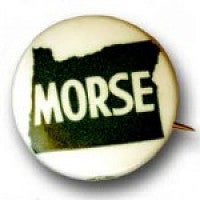In 1944, first-time candidate Wayne Morse beat the incumbent Oregon U.S. Senator Rufus C. Holmes, and went on to become known throughout the world as one of America’s most outstanding statesmen. Senator Morse championed civil rights, labor rights, and equal access to education, and was an outspoken defender of the Constitution’s checks and balances.
Senator Morse’s beliefs and convictions transcended party lines. When President Eisenhower adopted Senator Robert Taft’s economic policies favoring big business in the early 1950s, Senator Morse defected from the Republican Party and became an independent. His reason was succinct: “Principle above politics.” Morse joined the Democrats in 1955, but

Morse held the conviction that the purpose of democratic politics is not to amass wealth, but rather to enable the country’s true wealth, its people, to flourish. In Morse’s own words:
“If you want to understand my political philosophy, here’s the basic tenet: I think the job of a U.S. Senator is to seek to translate into legislation values that promote the welfare of people. Because…the keystone of the Constitution is the general welfare clause, and the wealth of America is its people, not its materialism.”
